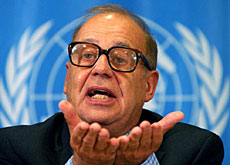Ziegler condemns worldwide hunger

Jean Ziegler, the Swiss academic and United Nations Special Rapporteur on the Right to Food, has said hunger is still a major global problem.
Presenting a report to the UN, Ziegler strongly criticised conditions in the Palestinian territories, saying the situation was bordering on a humanitarian catastrophe.
Addressing the General Assembly in New York on Tuesday, Ziegler likened the Israeli government’s policy towards the Palestinian territories to an “apartheid system”.
He said that 61 per cent of Palestinians were suffering from chronic malnutrition and that 85 per cent were totally dependent on humanitarian aid.
“The situation in the occupied territories is comparable to the situation in some parts of Africa, like Chad,” said Ziegler.
“Israel’s need for security is understandable, but every measure it takes shouldn’t be dictated by security,” he said, adding that Israel was obligated to ensure the right to food in the region.
Israeli reaction
Israel reacted critically to the report, saying that its recommendations were politically motivated.
Yakoov Levy, head of the Israeli delegation to the UN, told Swiss television that Ziegler was making suggestions that didn’t have anything to do with the food situation in the Palestinian territories.
Levy said an example of this was that Ziegler was recommending a radical change in Israeli security policy.
Ziegler has already come under fire from the Israeli government. In a letter dated October 7, Israel asked the UN to remove Ziegler’s mandate as UN Special Rapporteur on the Right to Food.
Negative report
Ziegler’s report paints a very negative picture of the global fight against hunger. The Swiss academic estimated that the number of people suffering from hunger worldwide had risen from 815 million in 2001 to 840 million last year.
He added that the situation was particularly bad for children – every seven seconds a child under ten dies directly or indirectly from hunger.
Ziegler also drew attention to the fact that more than two billion people worldwide suffer from “hidden hunger” or micronutrient malnutrition, which is not usually visible straightaway but which affects a person’s physical and intellectual development.
Another point was that women were often discriminated against when it came to gaining access to food, a phenomenon which was prevalent across the world.
Ziegler found that women were the head of the family in 30 per cent of rural households, but only accounted for two per cent of landowners.
The special rapporteur said food was a fundamental human right and that little progress was being made in the fight against hunger, despite promises made by governments at the World Food Summit in 1997 and reiterated in 2002 to halve the number of the starving by 2015.
However, he did add that there had been positive developments in the fight against hunger and malnutrition in both Brazil and Sierra Leone.
swissinfo with agencies
Ziegler’s report:
815 million people suffered from hunger in 2001.
The number rose to 840 million last year.
Every seven seconds a child under ten dies directly or indirectly from hunger.
Two billion people worldwide suffer from “hidden hunger” or micronutrient malnutrition.

In compliance with the JTI standards
More: SWI swissinfo.ch certified by the Journalism Trust Initiative

You can find an overview of ongoing debates with our journalists here . Please join us!
If you want to start a conversation about a topic raised in this article or want to report factual errors, email us at english@swissinfo.ch.